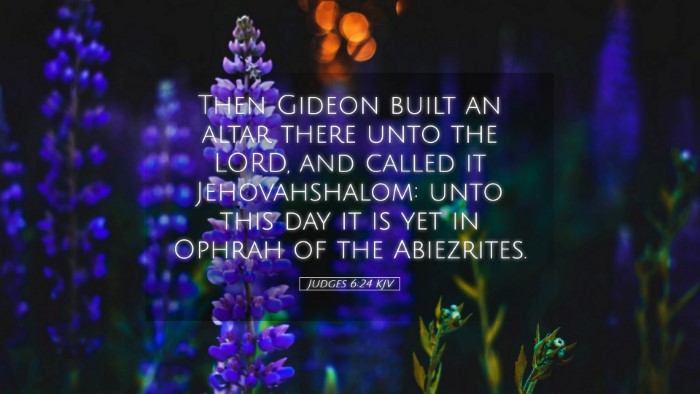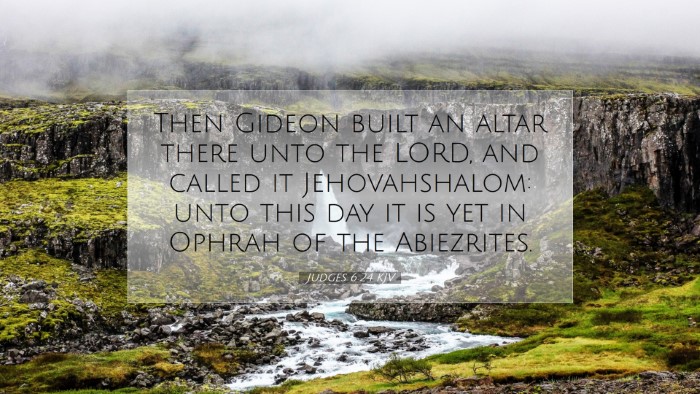Judges 6:24 - Commentary and Insights
Verse: "Then Gideon built an altar there unto the Lord, and called it Jehovah-shalom: unto this day it is yet in Ophrah of the Abiezrites." (Judges 6:24 KJV)
This verse marks a pivotal moment in the narrative of Gideon, highlighting his relationship with God and the importance of divine assurance. In the context of the book of Judges, Gideon's act of building an altar and naming it 'Jehovah-shalom' signifies a profound transition from fear to faith.
Context and Background
The Israelites were experiencing oppression from the Midianites, which led to deep spiritual confusion and turmoil. Gideon, when first approached by the angel of the Lord, was found hiding and uncertain of God's presence (Judges 6:11-12). This setting provides a backdrop for understanding the significance of the altar.
Gideon’s Altar
The construction of an altar symbolizes a response to divine encounter. As noted by Matthew Henry, “An altar is a token of worship, and it was a way Gideon acknowledged God’s presence and lordship.” This act was also profound because it demonstrated Gideon’s transition from the doubts he held to a place of trust.
The Name 'Jehovah-shalom'
By naming the altar 'Jehovah-shalom', which translates to 'The LORD is Peace', Gideon encapsulated the essence of his experience with God. According to Albert Barnes, this is emblematic of God's promise to provide peace amidst conflict. Peace here is not merely the absence of strife but a deep, abiding assurance rooted in God’s presence.
Theological Implications
This moment serves to emphasize several theological themes:
- The Nature of God: God is portrayed as a source of peace, which is paramount for the Israelites facing external threats and internal chaos.
- Faith and Fear: Gideon’s initial fear contrasts starkly with his subsequent faith. His journey from fear to faith underscores a critical aspect of the believer's life — the challenge of trusting God amidst uncertainty.
- Worship and Service: Establishing an altar signifies the proper response to divine revelation. Worship is foundational to serving God, with Gideon exemplifying this as he transitions from being a fearful farmer to a leader and judge.
Historical Context and Significance
In the broader narrative of Judges, Gideon's story embodies the cyclical pattern of Israel's disobedience, oppression, repentance, and deliverance. Adam Clarke notes that Gideon’s altar serves as both a personal and communal symbol of hope. It signifies a return to covenant faithfulness and the acknowledgment of God’s sovereignty.
Subsequent Developments
The importance of this altar extends beyond this moment, as it foreshadows Gideon’s role in securing Israel’s freedom from the Midianites. It illustrates that true peace can only be attained through yielding to God's will, which is further evidenced in Gideon's subsequent victories.
Application for Today
For modern believers, Gideon’s act of building an altar can inspire various applications in their spiritual lives:
- Creating Spaces for Worship: Just as Gideon built an altar, Christians today are encouraged to establish personal and communal spaces where they can encounter God and respond in worship.
- Naming Our Experiences: The practice of naming our encounters with God, much like Gideon named his altar, can help us articulate the attributes of God we experience, fostering deeper faith and understanding.
- Trust Amidst Trials: Gideon’s journey illustrates that faith does not often eliminate fear but empowers believers to act in obedience despite it.
Conclusion
Judges 6:24 encapsulates a transformative moment in Gideon's life and provides rich theological insight that continues to resonate with today’s readers. The act of building an altar signifies a commitment to worship, underscores God’s peace in troubled times, and exemplifies the faith journey that many believers navigate.
In the end, Gide's altar stands as a testimony of assurance and an invitation for all believers to trust in the Lord who is our peace, revealing an enduring promise of hope and divine presence in the life of faith.


